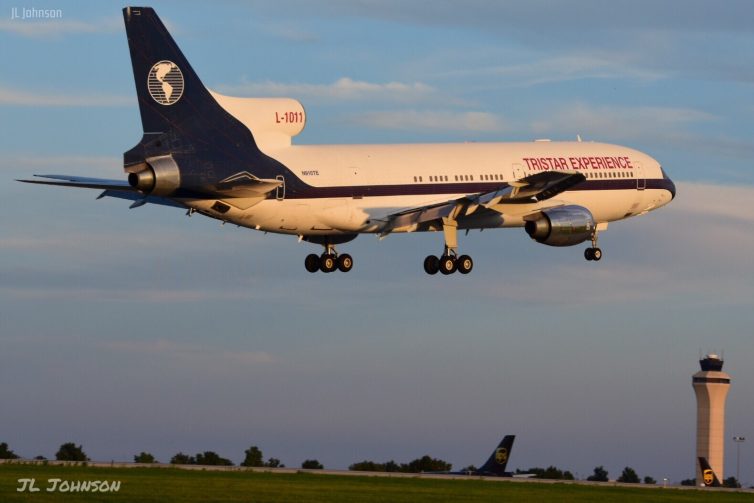
Lockheed L-1011 TriStar does a fly-by of Kansas City International Airport. – Photo: JL Johnson. Not for use elsewhere.
The Lockheed L-1011 TriStar was a plane with a tragically short lifespan. It was expected to be a real contender against the Boeing 747, Douglas DC-10, and Airbus A300. It entered the market late, in large part due to delays resulting from difficulty at Rolls-Royce, the only engine producer for the TriStar. Despite this, it is one of just a few airliners that elicits strong emotion from people of all ages and walks of life. It was received with much fanfare.
In business, however, fanfare does not necessarily equate to economic viability. In roughly two decades, just 250 units were produced – including an incredible number of custom variants. Few operators held onto their L-1011s for long before passing them along to others or sending them to storage. By most accounts, the TriStar was a failure. During development of the only TriStar engine option, the RB211, Rolls-Royce was deemed what modern day observers would call “too big to fail.” It was nationalized to avoid catastrophic economic impact to the United Kingdom and to keep the costly program afloat. Following the cancellation of the series, Lockheed fully withdrew from the commercial airliner market to focus on military and other industries.
But struggles in development, lackluster sales, and frequent turnover did not get in the way of the passion shared by those who had in some way experienced the TriStar. It was and is one of the most beloved planes in AvGeek culture. The TriStar was an underdog. People love an underdog story, and that is just what this is.
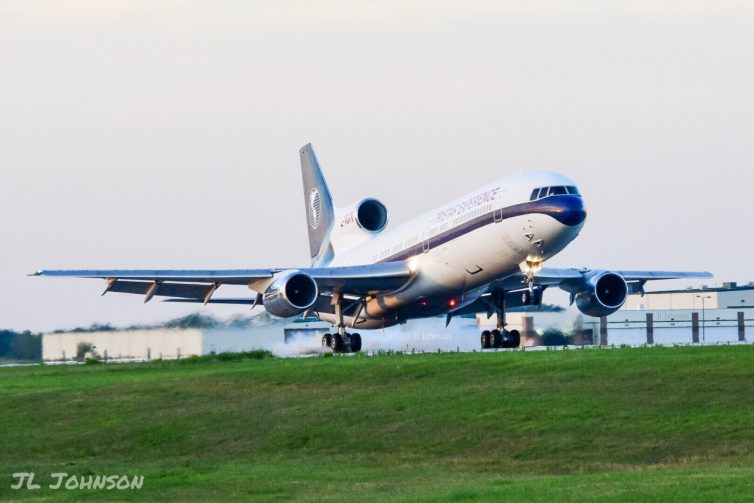
Lockheed L-1011 TriStar registered N910TE lands in KC, MO. – Photo: JL Johnson. Not for distribution elsewhere.
TriStar Experience- The organization behind the L-1011’s restoration
The people behind TriStar Experience, an all-volunteer organization, have worked tirelessly for years to source and restore unique and special aircraft for the purposes of inspiring the next generation of STEM (science, technology, engineering, math) workers. This L-1011 joins already completed projects such as the MD-83 N948TW, also known as Wings of Pride. Readers may recall that AirlineReporter was granted exclusive aviation media access of the arrival of TWA’s Wings of Pride in 2015.
The organization, a 501(c)3 non-profit, uses flyable jet aircraft for educational and experiential programs to inspire students into STEM fields of study. It seeks to support and cultivate those with interest to pursue aviation and aerospace related careers. Regardless of coursework or career, TriStar’s ultimate success is helping kids explore and achieve more than they thought possible. TriStar also supports other charitable groups with its operational jet aircraft.
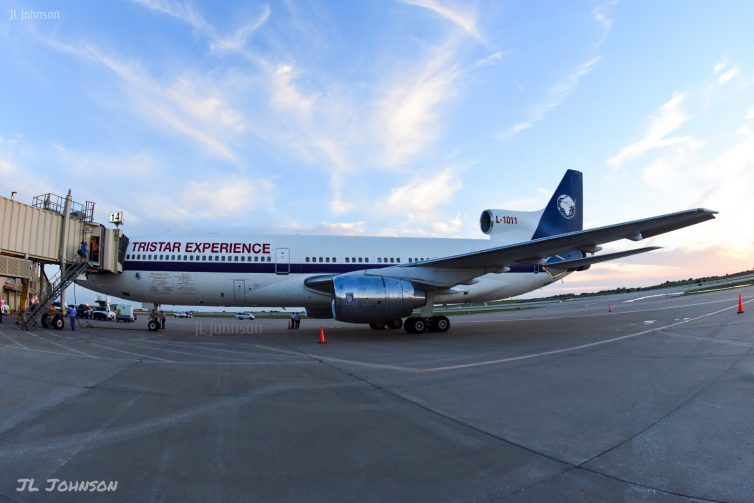
Lockheed L-1011 TriStar N910TE parked at Kansas City International Airport Gate 14 – Photo: JL Johnson
About this particular L-1011
I think we all can agree that L-1011s are special. But N910TE, built in 1974, is in a class of its own for a number of reasons. First, it was one of just two L-1011s which were specially configured for delivery customer Pacific Southwest Airlines (PSA) with a forward lounge in an area which would have typically been for cargo. Secondly, after serving with a number of carriers, this plane was acquired by a non-profit which converted it into a flying hospital. The majority of the plane has been thoughtfully retrofitted to medical treatment and surgical areas. The plane served on missions all around the world, bringing efficient and much-needed care to those in need.
The plane was stored at Tucson International Airport in 2001 where it remained until TriStar Experience acquired it. Restoration and maintenance work began in January of 2016 and continued through July 15, 2017, the day of its second ferry flight attempt.
- Scale and medical device storage. – Photo: JL Johnson
- Gurneys and other medical equipment line the walls. – Photo: JL Johnson
- The extreme rear of the plane is a sealed surgical center. – Photo: JL Johnson
Regarding the L-1011’s flight crew:
“Who in the world would still be qualified to fly this?” It was a common question on social media on the day of the arrival, for sure. I had an opportunity to ask Mike Saxton, TriStar Experience Co-Founder this very question. To my amazement, he pulled a notebook out of his satchel, flipped a few pages, and showed me.
The crew of the ferry flight was as follows:
Mark Kenny- Pilot in command. Current full-time 747 captain for Orbital ATK.
Howard “Dusty” Spain- Co-captain. Former L-1011 Captain for TWA
Dave Mattingly- Co-captain. Former L-1011 Captain for Delta Air Lines.
Mark Messler- Flight engineer. Current engineer at Orbital ATK.
Martin Pike- Airborne flight mechanic.
Lin Weeks- Onboard safety.
- Lockheed L-1011 TriStar Flight Engineer station. – Photo: JL Johnson
- Lockheed L-1011 TriStar Flight deck. – Photo: JL Johnson
The L-1011’s future
BONUS: PARTS TO PLANES: THE STORY OF JET MIDWEST AND A SHUTTERED AMERICAN AIRLINES (TWA) MRO
For the next few days, the L-1011 will remain at Kansas City International Airport’s shuttered A terminal, gate 14. KCI [as the locals refer to MCI] terminal A was closed a number of years ago and is not open to the public. Soon the plane will be towed to the maintenance, repair, overhaul area of KCI which was initially occupied by TWA. TriStar Experience is anxious to begin using the plane in its STEM programs in cooperation with local schools and non-profits, just as it does with TWA Wings of Pride at the downtown KC airport.
To learn more about TriStar Experience, its mission, and to consider donating to the organization, visit tristarexperience.org.
Comments are closed here.
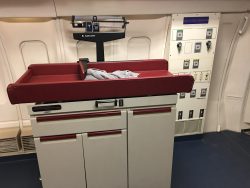
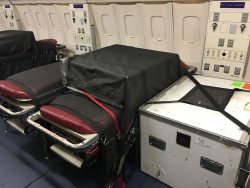
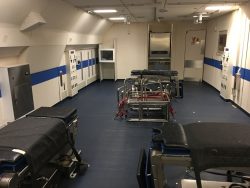
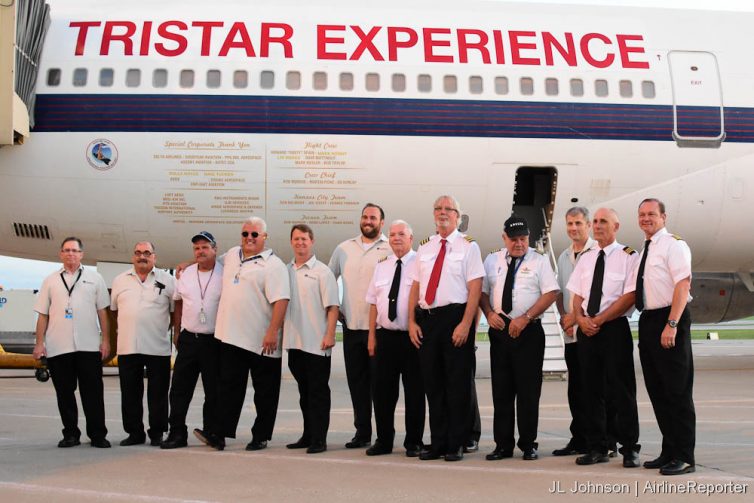
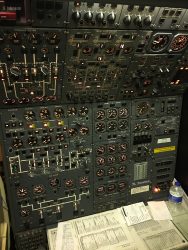
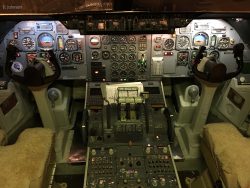
Great story. Nice to see an L-1011 again. We used to fly them to Hawaii and back. Good memories.
Love the L-1011. My dad worked at Lockheed and helped build these planes. Sure do miss him and the planes!
I am indescribably happy to see this rare and lovely bird saved in this way – and actually flown to her new home!
In British Airways I was hugely lucky to fly Tristars as a First Officer, Flight Engineer and Captain.
The Tristar had a sort of aura of pride and joy for all of the flight crews and cabin crews who flew her – like none other!
Happy Days!
Congratulations and Best Wishes to all those involved with this restoration and the great achievement of this ferry flight!
John Chapman.
Nice to see another aircraft from the past flying again. I very much enjoyed reading about this particular aircraft. Back during my days of crisscrossing the country on business I had many rides in the L-1011, including with TWA, Eastern and Delta, but mostly Delta.
Although I wasn”t especially fond of the L-1011 over other airliners of the day (I loved them all), a few things come to mind. First, as a passenger, I thought the configuration of the overhead bins in the cabin was rather odd. They seem to have been designed by someone who did not understand the concept of gravity. As I recall, they had two shelves, the lower one being smaller than the upper one. They were only large enough to hold maybe a hat on the lower shelf and a coat on the upper. I didn”t think they were very functional as items tended to fall out when the door was opened at the end of the flight. They can be seen (closed) in the L-1011 brochure on this website under Related Airlinereporter Posts. Every L-1011 I flew on had identical bins, so they were obviously not something subject to airline specifications, but they did give the cabin a very spacious look. Of course, seat pitch was much greater than it is today, so any carry-ons would fit easily under the seat in front of you without taking away much leg room. Remember, those were the days before passengers aimed to stuff all their earthly possessions into the overhead bins.
As an aeronautical engineer, I was always curious about the differences between the center engine installations of the DC-10 and the L-1011. I remember reading an article in a prominent aviation magazine of the day on this subject. Both Douglas and Lockheed engineers had carefully analyzed each installation configuration and concluded that the one they picked was much better than the other. The S-shaped duct of the L-1011 seemed to me to be a disadvantage due to inlet losses and unequal pressure distribution at the engine inlet, although the engine thrust vector was much more aligned with the aircraft CG. Engine installation, maintenance, and removal would be better for the DC-10 since the L-1011 engine is buried deep in the aft fuselage. Of course, maintaining and handling either centerline engine would be much more difficult when compared to simple wing pylon installations.
I was surprised that only 200 L-1011s were built. I wonder if the Eastern Airlines L-1011 crash in the Everglades was the beginning of the end for both Eastern and the L-1011.
Thank you for publishing this article. I look forward to reading more about this aircraft in the future.
Joe, it’s a wonderful airplane and I loved them, but it was a financial disaster for Lockheed. There is a Harvard Business School case on it and it makes it clear that, for some unexplained reason, the board of Lockheed green-lighted the project when a simple review and analysis of the numbers would make it evident that financial failure was inevitable. But the board only knew about defense projects, where profit is guaranteed, so they did not know how to make a commercial decision.
My guess is corporate ego. They didn”t want to be left behind by Boeing or Douglas. Same with Convair and the 880/990.
You’re ignoring the success of the Electra. Great airplane but again bad timing. The Electra has lived on though as the P3 Orion for the US Navy and others
Thank you to your marvelous comment. I used to Fly in TAP’s Tristar 500 hundreds and I’ve been reading a lot about this one of kind bird. Your comment added a lot Knowledge. Greetings from Rio de Janeiro, Brasil.
I worked on the L1011 since the first aircraft arrived at Eastern till the last was set down. The crash of flight 401 had nothing to do with the demise of Eastern Airlines or the L1011. You can blame that on Frank Borman who should have stayed in space, preferably outside the capsule. Hopefully his departure from this world will be on a desert L1011, in the S-duct!
The engine change was much easier than the DC10 or MD11. About the same as the B727, but much larger and heavier. Did many during my Career with Eastern !
We have an ex-FEDEX B727 (*’Gideon’*) at the Aerospace Museum of California, as part of our air park. How great it would be if we were fortunate enough to have a specimen of the superb L-1011 *TriStar*, as well (although where we’d put it, due to size, is a notable question! One must always think of important concerns like *ease-of-maintenance*, when designing *any* aircraft. I think of the Grumman F-14 *Tomcat*, whenever I think of engine change perplexities (with attendant overhaul considerations…or worse yet, the DeHavilland *Comet*!).
Cheers, C2
The ex-FedEx B727 may even be an ex-Eastern B727-100 which was an Aircraft you could remove the interior on pallets and had a cargo door to be used as a freighter.
What is the Manufactures serial number of the B727 ?
[image: image.png]
*Air Lanka Flight 512* was an Air Lanka flight from London Gatwick Airport via Zurich and Dubai to Colombo (Bandaranaike International Airport ) and Mal , Maldives . On 3 May 1986, the Lockheed L-1011 Tristar serving the flight was on the ground in Colombo, about to fly on to Mal, when an explosion ripped the aircraft in two, destroying it. Flight 512 carried mainly French, West German, British and Japanese tourists; 21 people were killed on the aircraft, including 3 British, 2 West German, 3 French, 2 Japanese, 2 Maldivians and 1 Pakistani; 41 people were injured.[1]
Boarding of the flight had been delayed due to the aircraft being damaged during cargo / baggage loading.[2] During boarding, a bomb, hidden in the aircraft’s ‘Fly Away Kit’ (a collection of small spare parts[3] ), exploded.
[4] The bomb had been timed to detonate mid-flight; the delay likely saved many lives.
The Sri Lankan government concluded that the bomb was planted by the Liberation Tigers of Tamil Eelam (LTTE) to sabotage peace talks between the LTTE and the Sri Lankan government. They reported that a search of the aircraft the next day uncovered a parcel containing uniforms with the insignia of the Black Tigers, the suicide wing of LTTE.[1] [5]
I do not believe the crash in the Everglades contributed to Eastern”s failure. I worked there for 10 years from Mechanic to Regional Manager, Aircraft Maintenance. The demise of Eastern was many things from deregulation, fuel cost, leasing aircraft long enough to have paid for them three times to one word ”Lorenzo” !!
By the way, that crash was pilot error, an before a proper ”Autopilot Disconnect Warning ” was implemented. They were troubleshooting a Landing Gear indication and pushed against the Control Column which disconnected the Autopilot in Altitude Hold and the aircraft descended. As a Flight Engineer I was taught, regardless of other activity in the cockpit ”Someone must fly the aircraft” !
Orbital ATK has a 747????
Haven’t found a picture, but the last bullet on this page mentions a 747:
https://www.orbitalatk.com/flight-systems/aerospace-structures/military-aircraft-structures/
So just to make sure, the chance to return to the air also remains with this bird like the Wings of Pride Mad Dog?
From the WoP piece:
“It will be kept in flying condition and pending various FAA approvals may be used to provide flights to patrons who supported the acquisition and re-livery before being used for educational purposes.”
If so, that’s pretty darned incredible!
MIke, yes you are spot on. Assuming funding is available they intent is for both to remain airworthy with the option to use for other sorts of missions. There have been a lot of talks about using WoP for honor flights, for example. But like all things, it comes down to cold hard cash, or in the case of non-profits, the lack thereof.
It is good to to see this smart designed aircraft back on air.
And it is very bad when you see a valuable and peace of mind job didn’t seceded
Worked an this aircraft as aircraft technician and it is the best in safety amongst all aircraft
Congratulations for team members restored it
I was one of the first people to be trained on this magnificent aircraft as a flight engineer at Delta Air Lines.
I later flew it as first officer, and still later flew it as Captain on both domestic and international routes.
Out of all the airplanes I flew for Delta the Lockheed L1011 was my favorite especially the 500 model.
I was truly sad to see it leave. I am ecstatic that this group has restored this great airplane.
I first was flew as a passenger on an Eastern L-1011 in 1979. I was sad when Eastern went out of business. Also sad the Lockheed company stopped production of the L-1011. There was an earlier post about the downfall of the L-1011 may have been the Eastern Airlines crash in Florida. That crash, Eastern flight 401 on Dec. 29, 1972, was determined to be caused by Pilot Error by the NTSB. From everything I’ve read, the L-1011’s safety record was tremendous. I don’t believe it ever had a crash due to mechanical errors. All crashes of the plane were caused by Pilot Error or Weather related issues.
Flew on the last TriStar flight by Cathay from Narita to Kai Tak. At that time I was on at least two International flights per week. Always looked forward to Cathay flights, particularly TriStar flights. Some how the TriStar was intimate but roomy. Only comparable place was upper deck on 747 SP. Today the A380 and 787 are simply too vast. Would hate to be consigned to cattle class on either.
A distant part of our firm made the engine oil and we were told to have pride in our firm. Then one day we were told to go outside and look up.
Suddenly this big, beautiful, white aeroplane appeared in a blue sky from behind the stone-green research block. It banked, waved at us and curved away – for ever.
I wanted to reach out and stroke it but I am not Superman.
I had several flights on the L-1011 on Delta from Atlanta to Denver. As a youngster I thought it was the nicest plane available! I think back then, the Airlines didn’t oversell the whole Aircraft like they do now.
My fondest memory was the long row of seats in the middle. Often I could find an empty row, pull up the armrests, and sleep comfortably lying down on the flight. That plane had lots of room!
We flew on the L1011years ago from Atlanta to Honolulu direct! It was huge, but I loved it. I felt very safe on this aircraft and there was all kinds of room, going and coming back! Would love to fly on one again!
Great Aircraft spent many days and nights maintaining it. Delta started with the -100 and had many models including the -250 and -500. If I remember correctly the original came with a fan reverser and turbine reverser. The coax cables to the fan reverser were it’s week spot.
Linda,
I like to share my experience too about this amassing bird. she had every thing specific. every where 3 try systems. even the fasteners were try called try wing head. oh! how can we forget. I am from Srilanka and was working in Airlanka, Srilankan airlines then in 1980s. we had 5 of them 3 -100s and 2 -500s, if i am not mistaken we ordered and received the last two -500s.
I was very happy to learn that the L1011 is back up and flying. It was ahead of its time and had a tragically short life. I flew on one to Hawaii back in the 1980s. I was allowed to step outside the rear exit door during a stopover and get a close look at the huge intake duct at the rear of the plane; a fond memory.
This aircraft was known as the only wanted a craft
This aircraft was known as the only haunted aircraft
so happy to see one still flying , it was a beautiful looking bird with a beautiful humming like sound.
As a pilot we all know that if an aircraft has a malfunction an you declared an emergency it is always pilot error it is never the aircraft’s faults or designs with billion dollar corporations it is easier to replace a pilot than a fleet of aircraft. Makes you wonder why they sell you insurance upon boarding an aircraft if the company is so sure that the aircraft’s are safe. What the public don’t know could put them in danger by pencil whipping the inspections by big corporations. I am a pilot and would never fly nor ride on any commercial aircraft. I have seen to many things. When I have an annual on my aircraft it takes 2 weeks during that time a commercial aircraft comes in it takes a day because the company is losing thousands of dollars and they want it back in the air within 24hrs hmmm makes you think but look at the bright side if they are caught it is a clerical error and maybe a small fine. If the airline is down the faa or ntsb has no job. Makes you think was it really turbulence or did something happen. Passengers will never know.
Well, I’m no expert, but it is easy to cite numerous examples that refute your assertions of bias against pilots (am I characterizing your comments accurately? Please correct me if not). Three examples within the past few years are: 1) US Airways: The NTSB itself recognized that the time necessary for the pilots to ascertain their situation was a factor in limiting their options to a landing in the Hudson (as opposed to the film which made the NTSB into the bad guys); 2) The Air France crash in the mid-Atlantic (from Buenos Aires to Paris) in which pilot “error”, in the form of failure to cope with a cascading series of failure, was found to be the cause (and which itself has come to be recognized as the main reason for accidents and thus is now the basis for a new training emphasis); and 3) the battery failures in the 787’s, hardly the result of anything the pilots did. I’m not saying the system is perfect, far from it, but if the system is not perfect than neither are any of its components, and that goes for pilots as well as their employers and regulators. So let’s all get objective in our reasoning, even if we think others are not, and abandon this cynical finger pointing. We have enough of that in politics, thank you very much.
Agreed. Don’t forget about southwest airlines fleet shutdown Orlando Florida regarding annual inspections.
Don’t misunderstand I have seen pilot’s that should not be able to fly a kite. I just don’t think that pilots should always be to blame and there are circumstances where you can do nothing but fly the plane as best as you can and record every detail. I also feel that as long as the aircraft is intact and pilot should be able to land safely with a dead stick. I have and had a lot of physical training unlike today’s simulation that are performed in simulator. In other words I didn’t have a restart button. The cost is cheaper than the real thing but it is not the same as a video game.
https://medium.com/@AviadoraDeCeilan/the-lawless-spirituals-cc204aeded25
first hijacking of a local airliner in Sri Lanka”s Aviation History- but never recorded as such.
AF’s 447 dive in mid Atlantic was Rio-Paris route.
As a pilot you can look up a flight that will show all aircraft along your route type tail number knots ect. Auto engaged or disengaged is not going to change your speed like taking your foot off a gas pedal it just slows down every aircraft manufacturers all aircraft aerodynamicly designs all aircraft to glide with angle of attack wings position my opinion there is more to the story on the black box that the public will never hear.
Of course. Thank you for correcting me on that.
I have been involved in many aspects of aviation for 63 years; as a mechanic, pilot and business owner. I respectful disagree with your assertions. Commercial personnel are well trained and by and large provide safe efficient service. That does not mean that high standards are not always upheld or errors never made. In my experience fault is well distributed among all participants in the industry; pilots, mechanics, dispatchers, cabin crews, controller, ground service, without favour as to responsibility when errors occur. This is true in military, commercial and general aviation. Quite frankly, your post shows an appalling lack of knowledge, understanding and attitude.
Well you should be working for the faa instead of retirement
Mr. Robertson when was the last time the NTSB call you for an opinion. I’m 1 of 3 in the U.S. that get calls for many incidents from a downed aircraft to search and rescue as well as angel flights. If you only knew who you were messaging. Didn’t find your aircraft experience in the database.
My first experience with L-1011 was at Stapleton Airport! It was reserved for the Denver Broncos!
Fantastic jet!
John,
You’re absolutely correct in that virtually ALL carriers do their absolute best to ensure safety while maintaining a flying fleet. Any incident could and would cost many millions more than letting a plane sit for a few days. I’m EMBARRASSED that “Pilot” would even make those allegations and his “1 of 3” statement speaks of his overblown ego.
The L-1011 was a forwardly designed airliner and had the RR engine debacle not delayed them many airlines would have flown it. And….for “Pilot”, I DID fly it 5 years as an Engineer AND a First Officer. Was in the Capt. upgrade process when the company closed down.
I had the privilege of working and flying on this actual aircraft for three years when she served as The Flying Hospital based out of Virginia Beach, and am thrilled to see her take to the skies again. Many, many lives were positively impacted by the medical teams and volunteers who served on her, and we were the better for having had the opportunity to do so. We flew around the world many times (once, to 18 countries in 9 weeks) and I loved every minute that I spent on board, or watching her land or take off. Thank you so much to the folks who invested the time, money and talent to get this lovely lady flying again!
I was working at Marshall of Cambridge when this L1011 came in a couple of times as a flying hospital and I got to look around it, I remember being very impressed, great to see this aircraft back in the air again.
This is a wonderful story and fantastic news! I’ve been a huge fan of the L-1011 TriStar, beginning with my Saudi Arabian contracts back in the 80s. Saudia, the KSA national airline, flew an extensive fleet of TriStars under the Saudia flag and I well recall the great number of flights on that bird I experienced that took me from KSA to Europe and back, on R&R leaves. The weather over Europe is (as all ATPs with European experience know) some of the worst imaginable at times) and the approach to Geneva/Genf was always fraught with potential for weather-related complications (for ‘ordinary’ airliners). NOT the TriStar, with its excellent and unique flight-control/navigational capabilities. Introduced at the onset with the world’s only fully flight-rated Cat 3C ILS automated landing system, it would bore steadfastly and unflapably (no pun intended) through all those formidably thick cloud formations over the Alps (on the Genf approach) and land us neatly each time without as much as skipping a single beat of its three RR fanjets. Yes, I have a great affection for this magnificent bird (whose only faults, and not of its own inherent making, were bad intro-timing and Lockheed’s choice of an engine supplier). The only competition in the same class (tri-jet) was the DC-10, which wasn’t half the aircraft the TriStar was. Douglas didn’t even offer the Cat 3 system until much, much later when the aircraft was reintroduced in a newer iteration. I’d gladly pay full fare to have a chance to go up in a beautiful Lockheed TriStar one more time! I envy the STEM kids their opportunity! I keep a large scale model of the Lockheed TriStar (in Saudia livery) on my home shelf and every now and then I gaze at it with true appreciation! If that TriStar ever makes it out to Sacramento CA (the Aerospace Museum of California…www.aerospaceca.org), please let us know. We have a lot of aerospace-minded kids in our own STEM programs who would love to experience that big, beautiful bird!
I only flew on it once nonstop from Atlanta to Hawaii. It was a sweet flying machine. Had no idea it had such a tough beginning or just how much technology it was filled with.
I will always miss this plane. A raw deal. Great the plane is being used and not left to waste away.
Orbital ATK has an L1011 I was on test flight last year 2017
I worked these aircraft at Eastern Airline, it is a mechanics type aircraft. Good system layout and location, even the number 2 engine was easy to get at. Loved the bird !!
Flight Attendants did not like the nose up angle it flew at. Had the push the serving cart up hill and then hold on going back down. Galley was in the belly to make room for more seats.
I worked these aircraft at Eastern Airline, it is a mechanics type aircraft. Good system layout and location, even the number 2 engine was easy to get at. Loved the bird !!
Flight Attendants did not like the nose up angle it flew at. Had the push the serving cart up hill and then hold on going back down. Galley was in the belly to make room for more seats.
“Queen of the Skies” I flew the L1011-100 and -200 with Gulf Air and later the -500 with Caribjet over a seven year period. My previous jet time had been on the 707 and bizjets. The L1011 was light years ahead of first generation jets and was the first production aircraft with a reliable and safe Cat 3 autoland. The DLC system (Direct lift control) via spoiler deployment enabled variation in glide slope without pitch attitude change. Marvelous concept on a gnarly approach!
The flight deck was the most spacious of anything I’ve seen, including the 747 and DC10, and it was a delight to hand fly. Though flight was normally highly automated through the FMS system, two disconnect buttons- autopilot and auto throttle- instantly gave you a fully manual aircraft, a result today’s Airbus pilots can only dream of! The RB211 eventually turned out be a reliable engine but there is no doubt the early problems contributed to the Tristars demise. Sad, but that’s progress…I think?
I worked the L-1011 at Eastern as. a mechanic. I was Flight Engineer/Instructor/Examiner on C-141″s in the USAF Res at Charleston AFB. The Lockheed C-141 had almost identical systems and cockpit layout as the L-1011. Both ”Great Birds” !,
I remember my first ever flight (as passenger) from Manchester to Florida on an American Airlines L-1011 in Sept 1990, and I have to say that that was one of the most enjoyable and comfortable flights that I had ever been on. The Plane was flown brilliantly, so smooth and although if I recall we landed in Gander for what may have been a refuel, the whole experience was amazing and left me with no hesitation or concerns with flying. My love for planes and aviation was really down to that experience, so I guess it was easy to have such a fond connection with this make & model, even more so than the 747 which is by far still one of the most amazing Aeroplanes on the planet. Hope you don”t mind me sharing.. BTW, some very interesting comments on this article.
If you will, let me add my two cents worth to the the fine comments above. I flew captain on the l-1011 for 15 years both domestic and to Europe for Delta Air Lines. Of the 38 years with Delta, I enjoyed flying the Tri-Star more than any other airline airplane. A thank you to all of he above.
The l-1101 for me in 1993 changed my life. I was 8 and was invited into the cockpit for a 45 min tour. Landed in Halifax from Reykjavik, Iceland. Was explained the tech in the plane was far ahead of its time, during normal conditions the jet could fly its self right up to the outer markers of the airport on auto pilot. I was able to see the Northern Lights from the air. Anyways, i have been fascinated with flight ever since. Putting around on the family’s crop duster is as far as I ever got off the ground, but needless to say, The L-1101 was the Tailpusher that changed my life :).
FYI. Eastern or other airliners” L-1011 crashes have absolutely nothing do with the demise of L-1011. Simple put… DC-10 beat L-1011. The most hurtful part that hurts L-1011 was because they chose ONLY ONE engine brand. Guess? Rolls Royce engines was the ONLY one. No buts. Take it or leave. DC-10 offer better engine options that suits customers” preference. General Electric or Pratt”s Whitney engines. Look at 747 they offer 3 choices of engine options. GE, PW, and RR. During early 70″s RR workers went on strike and crippled Lockheed”s scheduled production and delivery which forced airliners to order DC-10 or 747 to maintain their planned service schedules. Delta was world”s first airliner to have all 3 jumbo jets at the same time. L-1011, DC-10-10 and 747-100 in 1970″s. Delta then got rid of DC-10/747 after their L-1011 orders caught up. Also Delta bought lot of ”used” L-1011 from Eastern. Yes Lonely was the culprit of the demise of Eastern. Sad! I loved to watch tons of Delta and Eastern in ATL. BEAUTIFUL BIRDS! L-1011, DC-10, 747, 727, DC-8, 300, 757/767. Now All Booring 737/320″s. In my opinion, During 70″s had L-1011 offer 2-3 engine brands in the line. I think L-1011 would have beat DC-10 on the other hand DC-10-30/40 have better capabilities than all L-1011 series! That could be toss up during 80″s. FYI. American Airline and United did (seriously) considered L-1011 but they don”t want RR engines. So they opted DC-10. L-1011 and DC-10 in 70″s was the best technology that advances toward 787/350 of today. We should be thankful for those birds that existed/exists. Technology of nowadays are able to combine capabilities and efficiency compare to capabilities of 70″s. Not the fuel consummation. (Efficiency). Three of DC-10/MD-11 and L-1011 are the most beautiful and classic Tri-Jets ever exist.
Thanks for your, um…’enthusiastic?’…opinions on the DC-10/L-1011 matter. I wish your statements were a bit more coherently articulated, since it would probably help me better understand what you are trying to say there, but from what I gather you appear to be a big fan of the Douglas bird and I’m happy for you on that score; we all need our pet biases to help keep the world’s informational navigation system in balance. However, I feel a careful examination and comparison of the two aircraft types would refute a few of your broader arguments (among them, that the DC-10 was a superior bird, etc.); that point is contentious and seriously arguable, as anyone who has carefully studied the developmental histories of both types would likely agree. As for the engine details, you are of course entirely correct. The RR engine fiasco certainly put more than a few aircraft rivets in the TriStar’s coffin, but of course the TriStar’s demise wasn’t attributable to a single factor, as we all know, despite that factor’s major role in things. Personally speaking, my own opinion is that from an aesthetic standpoint the TriStar was the more aerodynamically graceful of the two; that big engine rather awkwardly perched midway up the DC-10/MD-11 vertical tail assembly certainly would never win any airliner beauty contests (:p) and naturally the unforeseen adverse positioning of the DC-10’s redundant hydraulic systems caused those catastrophic events associated with engine failure we are all familiar with. That sort of thing would never have happened on a TriStar (tsk), given its meticulously fail-safe engineering layout. That said, thanks for enlightening us with your insights, regardless of the questionable nature of a couple of them! In the end, we are, I think it’s safe to say, all fans of the fabulous tri-jets of the 70s/80s! It was a fabulous age in which to fly (whether on the flight deck or in the back of the bus with all the rest of the steerage geese, LoL).
I have been a Mechanic, Foreman and Manager of Checks and Overhauls on all three, three engine wide body aircraft. My preference is (1) L-1011, (2) MD-11 (3) DC-10-10 or -30
I was a mechanic at Eastern and after Eastern,United.The L1011 was far superior.and safer. It was cutting edge technology at the time. The systems were easy to access.Number 2 engine was easy to access.DC10 number 2 was a nightmare.DC10 crashes do to cargo doors failing,AA flight 191 leading edge flap asymmetry problem when the engine came off,UAL Iowa when number 2 engine failed and severed hydraulic lines rendered the entire system inop.It was before ETOPS that”s they had to have 3 or 4 engines to meet the over water requirements.
I was an electrical installer and inspector on the L-1011 in the early 70s. Im so glad that at least on of these great airplanes is still being flown.
I was one of the technicians that worked on the project to turn this aircraft into a hospital ship in 1996, at Lockheed’s Tucson facility. Beautiful airplane!
So.. a few years on, what was made of this L-1011? Did it ever fly again? The “learn more” page (tristarexperience.org) gives a blunt “forbidden” response, which must not mean anything good.
Hard to say, but undoubtedly the money aspect of keeping that beautiful bird in top shape must be a consideration of some significance, in my opinion. The ‘forbidden’ probably just means the website is slightly out of whack.
Cheers, K2
Hey, folks. It continues to serve its purpose. See my most recent AirlineReporter story on it: https://www.airlinereporter.com/2018/05/tristar-experience-uses-l-1011-to-advance-stem-education-initiatives/
Nice report and great to hear! She’s a rare bird. Thanks for that update.
Cheers, K2
PS: I doubt seriously if it will ever fly again (again, given the immense costs involved). My impression was that they will be maintaining it as a ‘grounded learning venue’ for STEM-related courses, sadly enough. Love to see it spread its wings and reach for the skies once again!
Cheers, K2
That’s a good question! I tried to contact their foundation to see if they made flights with that bird out to various other areas (such as ours), since the STEM learning programs at my local air museum (Aerospace Museum of California, in Sacramento CA) would LOVE to see it and participate in the experience, but never heard back from them. I rather suspect that it is pretty much permanently grounded there at their base of operations and used as a ‘local’ instructional classroom, etc., since the costs associated with actual flight operations would be huge (not to mention the potential liability suits should it go down with a load of kids aboard, God forbid). Money is very likely a major issue here (as well as flight safety concerns). What a shame, since it would be absolutely glorious to see that beautiful bird in the air again (and touching down at our local former McClellan AFB main runway).They don’t make ’em like the TriStar anymore, sadly!
I was a Lockheed Lead-man Production Mechanic on the L1011 (Electronic Automatic-Flight Controls) Wing Assembly and worked with many of the best/finest aerospace engineers and technicians in the industry.
The L1011 was and is the product of geniuses, and as it’s extraordinary records of performance reveal and verifies – The L1011 Tri-Star – is one of -The Aerospace Industry’s Greatest Achievement –
for all times.
You were a very good leader for an outstanding team
You were a very good leader for an outstanding team
I worked at Delta from 1990 to 2000 on the L1011 as a hangar Mechanic for the first couple of years doing H checks on them and then in Line Maintenance for the remainder of that time. The L10s were maintenance pigs but I very much enjoyed working on them and to date they still rank number one as my favorite aircraft to have worked on and I have worked on most fleet types for Delta. I can still remember seeing the smoke during start up and feeling the ground shake from the roar of the engines. Truly an unprecedented design for its time and very unique in so many ways.
Dear sir,
Could you please call me at 213-453-1736
Looking for cargo plane to buy or lease.
Thank you
Edward
I recall flying in Air Canada Tristars in the 70’s. Wonderful planes. But when leaving Calgary the only jet I have ever flown on that needed to do a “run-up” before the runway.
Interesting. Could you explane more abou that?
Colin, I was a Flight Engineer, or Second Officer on those Air Canada L-1011s you flew on. My first aircraft assignment with Air Canada.
The engines had to be run up in cold weather like that because the RB-211s could get icing on the fan blades that led to vibrations on takeoff. So reason for the run up in Calgary.
I really liked the L-1011s, flew overseas on them a lot, especially the later -500s. I did get some stick time , on ferry flights, but was never checked out as First Officer. Went on to spend a lot of time on the DC-9-32s, the B-767, then on to Airbus 319-320-321 series.
Still remember the L-1011 fondly.
Thanks Ray, for the explanation, and what a great career! That was a special flight for me. I was a 16 year old student pilot and enroute asked if I could visit the flight deck. To my amazement the captain, Doug Moore, got me strapped into the jump seat over Winnipeg and I stayed there for the night landing on (then) rwy 14 at YYZ. I recall the ATC folk knew Doug by name and he smoked his pipe during landing while the F/O did the chores! Best AC flight ever.
Cheers for the holiday season,
Colin
On this Christmas Day, as depressing as this whole year of 2020 has been, reading through all the fond recollections of the TriStar here brings to mind another L-1011 flight I made to spend Christmas in Switzerland on a Saudi bird (in the mid-1980s). It was typical Northern Euro weather we penetrated that day, as we flew an early segment of the Geneva approach over the Alps. We couldn’t see those magnificent peaks below us, in all their frosty glory, since visibility was (as usual) zilch, but we certainly felt all the shake, rattle & roll that those TriStar internal cabin partitions were famous for as the mountain turbulence made itself felt. Everyone was in a fabulous holiday mood, anticipating the holiday festivities that awaited on the ground, all over Switzerland, of course, and when we at last lined up on final, visibility remained as it had been…pea-soup! Undaunted, that big beautiful bird flew a perfect, ‘kiss-the-tarmac’ landing, thanks to its excellent Cat-3 ILS.
We all applauded the captain for his perfect touchdown, but as he later confided, the bird’s auto-land system deserved all the major credit! After we all deplaned and went inside the terminal lounge, I lingered by the big windows and gazed admiringly at that Saudi TriStar workhorse! Finally, after a long wait, I spotted the Captain get off the plane with his flight deck cohorts. I swear, he walked up to the plane’s nose and rested his land on her nose-gear for a full 30 seconds before, with a last reflective look at her in the softly falling snow, joining the others inside. I could swear he was thanking her affectionately, rather than just checking her brakes’ thermal status! At least that’s the impression I got and it remains today as one of my fondest Christmas recollections of all those good years of faithful, reliableTriStar service! Happy holidays to all of you who have flown the late-great L-1011…either as ‘geese’ or as crew! [And yes, I AM a sentimental old SOB, LoL!]
I was an line maintenance A&P mechanic and, also worked in line maintenance avionics with Eastern Airlines in Miami, and in Atlanta. I worked in the L-1011 Service Center in Miami where we were dedicated to that fleet before transferring to Atlanta. I had a lot of time on the L-100, a lot of training, factory training, etc. At its inception, it was a complicated airplane with many new innovative systems. Eastern put a lot into getting the Tristar to a level of reliability necessary for scheduled airline operation. Our engineers, technical services, and maintenance worked through a lot. There are a lot of stories about experiences with the L-1011. Most are true. It could often humble the best technician. I wish it would have had the lifespan of other aircraft of its era. A beautiful airplane.
There is a documentary on the Smithsonian Channel about a L-1011 ”STARGAZER” still in operation used to launch rockets carrying radio satellites from high altitude.
I would imagine parts would be difficult to obtain for a restoration and maintenance.
My father retired as a Lt. Col. USAF after a career in flying in SAC, a base commander in the Philippines-Vietnam, flying C-130’s and over 10,000 hours of flight time.
Previous to that he was a B-17 pilot in WWII.
He retired in 1969 and was hired to work on the L1011’s at Lockheed Burbank, Ca. He held a Bachelors degree and two master’s degrees in engineering.
As a younger kid (12) my father was very proud of this airplane and I remember being toured through the airliner as they were finished and ready to leave the assembly line.
I love the stories told here and recollections of how outstanding the plane was. I know my father was a perfectionist and wouldn’t put his seal of approval on anything he didn’t believe to be up to his standards. I haven’t thought of this for years until I came upon this article. Thank you for the smiles and memories.
I worked at TWA from 1976 to 1986 and enjoyed selling, scheduling and riding in the L-1011 as a “non-rev” including many transcon and transatlantic flights. As someone else mentioned, the engine start-up with the low rumble and smoke were typical. Some later variants (-100 for TWA) had more practical overhead bins by joining two bin doors as one to make the compartments wider. But TWA ended up taking out a couple of J class seats in the last row on the right side to put in luggage racks in the business class cabin. Also had a chance to take the elevators down to the lower galley area. As many have relayed in the comments above, the pilots loved flying it. If am recalling correctly, TWA’s int’l 3 class configuration was 272 seats on the L-1011 fleet.